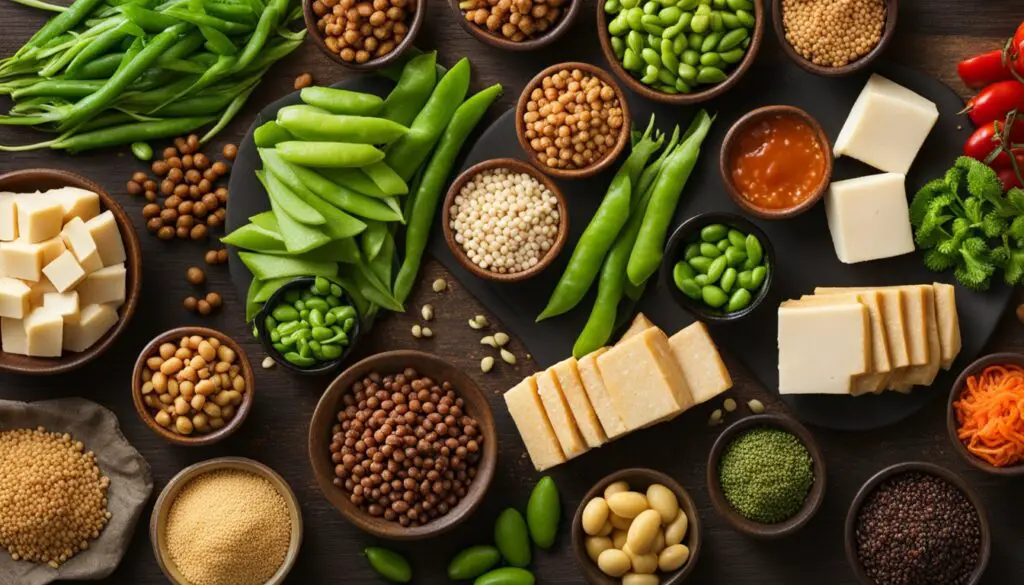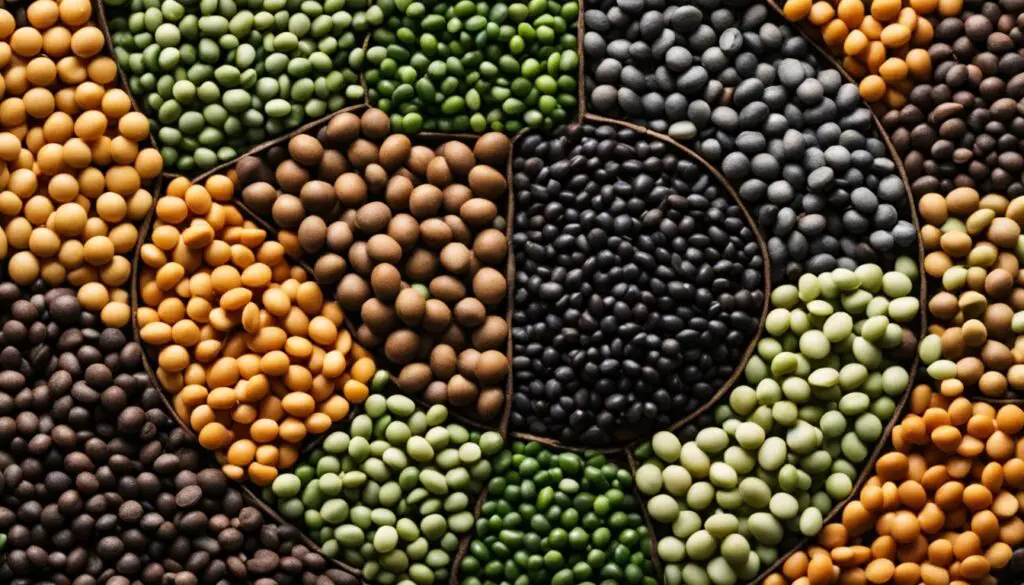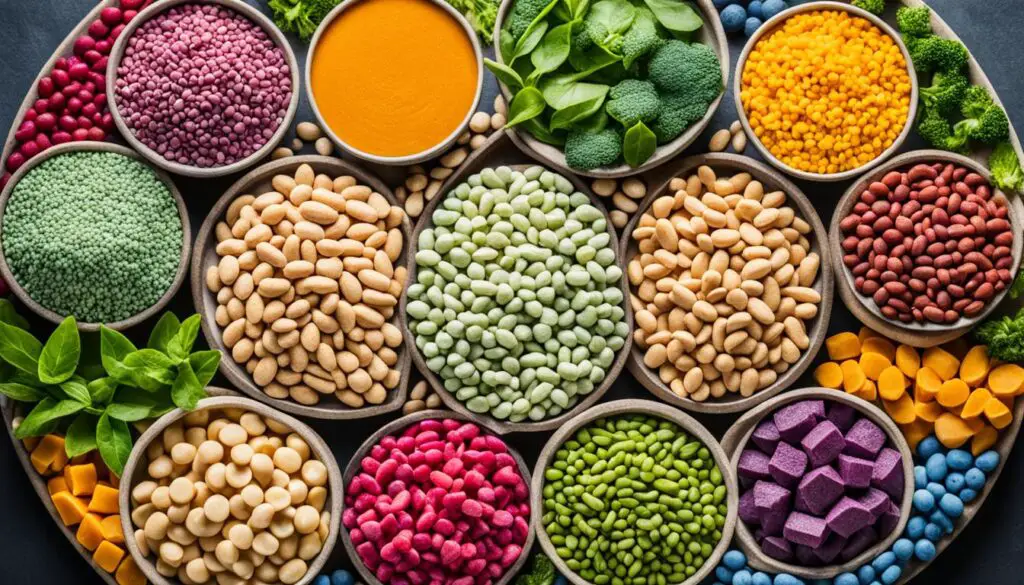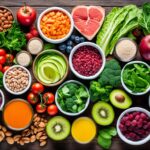Many people think it’s hard to get enough protein on a vegan or vegetarian diet. But, the truth is, there are many vegan protein sources out there. These make it simple to get the protein you need without eating meat.
Samantha, a vegan and fitness lover, was worried about getting enough protein after switching to a plant-based diet. But she found many high-protein vegan foods. These foods helped her workouts and matched her values.
Key Takeaways
- A plant-based diet can provide all the essential amino acids and protein your body needs.
- Incorporating a variety of vegan protein sources like tofu, tempeh, lentils, and quinoa can help you meet your daily protein requirements.
- Many vegetables, grains, and legumes are surprisingly high in protein, making it easy to build a balanced, nutrient-dense vegan diet.
- Vegan protein sources are not only beneficial for your health but also align with ethical and environmental principles.
- With a little planning and creativity, you can enjoy a delicious, protein-rich vegan lifestyle that supports your fitness and wellness goals.
Tofu, Tempeh, and Edamame: Soy-Based Protein Powerhouses
Soy-based products like tofu, tempeh, and edamame are great for vegans and vegetarians. They are packed with plant-based protein and other nutrients that boost your health. These ingredients are perfect for anyone looking to eat well.
Tofu: A Versatile Soy Supefood
Tofu comes from coagulated soy milk and is very versatile. It can be used in many dishes, both savory and sweet. A half-block of tofu gives you 16.3 grams of protein, making it a top choice for vegans and vegetarians.
Tempeh: A Nutty, Protein-Rich Fermented Soy
Tempeh is a fermented soybean cake from Indonesia. It’s firm and dense. One cup of tempeh has 20.3 grams of protein and probiotics. You can add it to stir-fries, sandwiches, or eat it alone.
Edamame: Soy Beans in the Pod
Edamame are young soybeans still in their pods. They’re often eaten as a snack. A 120g serving has 17.2 grams of protein. You can boil, steam, or eat them straight from the pod for a protein boost.
Looking to eat more vegetarian proteins or soy products? Tofu, tempeh, and edamame are great options. They’re versatile, tasty, and full of nutrients. Try them out and see how they can improve your meals.

Lentils: A Protein-Packed Pulse
Lentils are a powerhouse for vegetarian proteins and meat-free protein sources. These small, lens-shaped legumes for protein are packed with nutrition. They offer about 25 grams of protein per cup, which is half your daily need.
Lentils are known for their high protein content. They have essential amino acids like lysine, arginine, and glutamic acid. This makes them a complete protein source. They also have lots of fiber, iron, folate, and other nutrients that are good for your health.
Lentils are very versatile. You can use them in many dishes, from curries and stews to tacos and salads. They have a mild, earthy taste that goes well with spices and other foods. This lets you be creative in the kitchen.
If you love lentils or are new to them, adding them to your vegetarian proteins is a good idea. They are packed with nutrients and can be used in many ways. Lentils are a top choice for plant-based protein.

“Lentils are a delicious, nutrient-dense way to boost the protein content of your meals. Their versatility makes them a must-have ingredient for any plant-based diet.”
| Lentil Variety | Protein Content (per cooked cup) |
|---|---|
| Brown Lentils | 15 grams |
| Red Lentils | 18 grams |
| Green Lentils | 18 grams |
| Black Lentils | 16 grams |
| French Lentils | 13 grams |
Top 10 Vegan Protein Sources
Keeping a balanced diet is key on a plant-based lifestyle. Luckily, there are many meat-free proteins and high-protein vegan foods to help you meet your protein needs. From soy-based proteins to grains and seeds, here are the top 10 vegan protein sources for your meatless diet and muscle-building vegan diet.
- Tofu, Tempeh, and Edamame – These soy-based protein powerhouses give you 12-20 grams of plant-based proteins per 3.5-ounce serving. They’re great for any vegan fitness nutrition plan.
- Lentils – This pulse is packed with about 18 grams of meat-free proteins per cooked cup. It also has fiber, iron, and plant compounds.
- Beans – Beans, like kidney and black beans, or chickpeas, are a versatile and protein-rich legume. They offer 13-15 grams of cruelty-free protein per cooked cup.
- Nutritional Yeast – This protein-rich seasoning gives you about 8 grams of meatless protein per 2 tablespoon serving. It’s a great vegan addition to meals.
- Quinoa and Ancient Grains – These surprising protein sources have 6-10 grams of plant-based proteins per cooked cup. They also offer complex carbs, fiber, and essential nutrients.
Other great vegan protein alternatives and meat substitutes include green peas, nuts, seeds, spirulina, and potatoes. Adding these high-protein vegan foods to your diet helps meet your veganism and protein needs on a plant-based diet.
The daily protein intake for adults is 46-56 grams. Protein should make up 10-35% of your total calories. So, whether you’re a vegan bodybuilder or just want to improve your meatless diet, these top plant-based proteins can change the game for your nutrition facts and health.
Beans: A Versatile and Protein-Rich Legume
Beans are a powerhouse in plant-based protein. Kidney, black, pinto, and chickpeas offer about 15 grams of protein per cup. They’re not just high in protein, but also bring many other benefits.
Beans are full of fiber, iron, folate, phosphorus, and plant compounds that are good for you. Adding them to your vegetarian proteins or meat-free protein sources makes your diet more complete. You can enjoy them in chilis, curries, soups, or even homemade hummus. Beans are a tasty and nutritious choice for a plant-based diet.
| Bean Variety | Protein per Cooked Cup |
|---|---|
| Kidney Beans | 15.3g |
| Black Beans | 15.2g |
| Pinto Beans | 15.4g |
| Chickpeas | 15.0g |
Adding different legumes for protein to your meals helps you get enough protein. These vegetarian proteins also offer many other health benefits.
“Beans are a great source of plant-based protein, fiber, and a variety of essential nutrients. They’re a nutritious and affordable way to boost the protein content of your meals.”
Nutritional Yeast: A Savory and Protein-Rich Seasoning
Don’t be fooled by the name “nutritional yeast.” It’s an inactive yeast that tastes like cheese and is packed with 4 grams of protein per 2 tablespoons. It’s also a top vegan source of vitamin B12, which is hard to get from plants. Add it to pasta, popcorn, or mix it into sauces for extra protein and taste.
Nutritional yeast is a standout among vegan protein powders. It’s a seasoning that fits into many dishes. Its unique flavor and high nutrition make it a favorite for plant-based diets.
- Provides 4 grams of protein per 2 tablespoons
- Rich in vitamin B12, which is crucial for vegans and vegetarians
- Adds a savory, cheese-like flavor to dishes
- Versatile ingredient that can be used in sauces, dressings, and more
Looking to increase your meal’s protein or add a special umami taste? Nutritional yeast is a key item for your vegan kitchen.
“Nutritional yeast is one of the best sources of vegan protein that can be easily incorporated into a variety of dishes.”
| Nutrient | Amount per 2 Tbsp |
|---|---|
| Calories | 60 |
| Protein | 4 g |
| Carbohydrates | 8 g |
| Fiber | 2 g |
| Vitamin B12 | 8 mcg |
| Riboflavin (B2) | 0.5 mg |
| Niacin (B3) | 3 mg |
| Zinc | 2 mg |
Quinoa and Ancient Grains: Surprising Protein Sources
Many people think of legumes, nuts, and soy when they hear about plant-based proteins. But, ancient grains like quinoa, spelt, and teff are also great options. These meat-free proteins and vegetarian protein sources can help increase your high-protein vegan foods intake.
Quinoa is often called a “superfood” because it’s a great whole grains protein source. A single cooked cup has about 8 grams of nutrition facts. It’s also a complete protein, giving you all the essential amino acids your body needs.
Quinoa isn’t the only grain that’s high in protein. Spelt and teff are also great plant-based proteins. They can add a lot to your daily vegetarian protein sources intake. Each cooked cup has 10-11 grams of high-protein vegan foods.
“Quinoa, spelt, and teff are nutritional powerhouses that can help you meet your protein needs on a plant-based diet.”
Adding these whole grains protein sources to your meals can easily increase your meat-free proteins and nutrition facts. You can make everything from fluffy quinoa bowls to hearty spelt salads. These ancient vegetarian protein sources offer endless possibilities.
So, when you’re looking to add more plant-based proteins to your diet, don’t forget about ancient grains. They might be the high-protein vegan foods you’ve been searching for.
Conclusion
This guide has shown you the top 10 vegan protein sources for a plant-based diet. From soy-based foods like tofu and tempeh to lentils, beans, and ancient grains, there are many options. These foods are packed with protein and can help you meet your daily needs.
If you’re a vegan bodybuilder or just want more plant-based protein, this guide has you covered. It gives you the knowledge to choose the best vegan fitness nutrition. By using different plant-based proteins, you can make a diet that helps you build muscle and stay healthy.
Vegetarian and meatless protein sources are just as good as animal-based ones. Try the high-protein vegan foods from this guide in your meals. They support your plant-based lifestyle and health goals.



